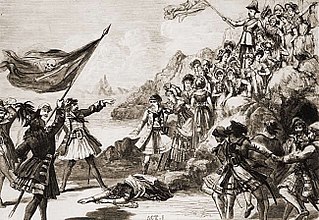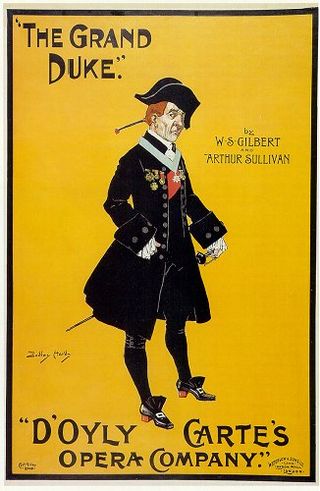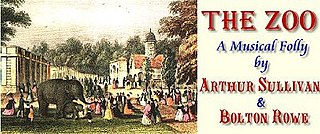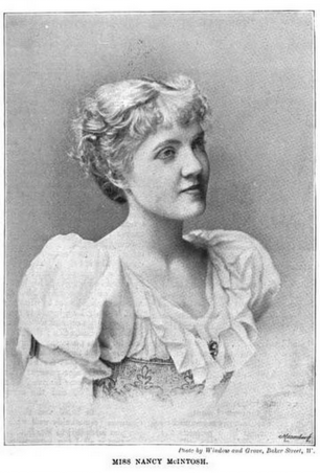
Gilbert and Sullivan was a Victorian-era theatrical partnership of the dramatist W. S. Gilbert (1836–1911) and the composer Arthur Sullivan (1842–1900), who jointly created fourteen comic operas between 1871 and 1896, of which H.M.S. Pinafore, The Pirates of Penzance and The Mikado are among the best known.

Sir Arthur Seymour Sullivan was an English composer. He is best known for 14 operatic collaborations with the dramatist W. S. Gilbert, including H.M.S. Pinafore, The Pirates of Penzance and The Mikado. His works include 24 operas, 11 major orchestral works, ten choral works and oratorios, two ballets, incidental music to several plays, and numerous church pieces, songs, and piano and chamber pieces. His hymns and songs include "Onward, Christian Soldiers" and "The Lost Chord".

The Pirates of Penzance; or, The Slave of Duty is a comic opera in two acts, with music by Arthur Sullivan and libretto by W. S. Gilbert. Its official premiere was at the Fifth Avenue Theatre in New York City on 31 December 1879, where it was well received by both audiences and critics. Its London debut was on 3 April 1880, at the Opera Comique, where it ran for 363 performances.

Utopia, Limited; or, The Flowers of Progress, is a Savoy opera, with music by Arthur Sullivan and libretto by W. S. Gilbert. It was the second-to-last of Gilbert and Sullivan's fourteen collaborations, premiering on 7 October 1893 for a run of 245 performances. It did not achieve the success of most of their earlier productions.

Princess Ida; or, Castle Adamant is a comic opera with music by Arthur Sullivan and libretto by W. S. Gilbert. It was their eighth operatic collaboration of fourteen. Princess Ida opened at the Savoy Theatre on 5 January 1884, for a run of 246 performances. The piece concerns a princess who founds a women's university and teaches that women are superior to men and should rule in their stead. The prince to whom she had been married in infancy sneaks into the university, together with two friends, with the aim of collecting his bride. They disguise themselves as women students, but are discovered, and all soon face a literal war between the sexes.

Thespis, or The Gods Grown Old, is an operatic extravaganza that was the first collaboration between dramatist W. S. Gilbert and composer Arthur Sullivan. No musical score of Thespis was ever published, and most of the music has been lost. Gilbert and Sullivan went on to become the most famous and successful artistic partnership in Victorian England, creating a string of enduring comic opera hits, including H.M.S. Pinafore, The Pirates of Penzance and The Mikado.

The Gondoliers; or, The King of Barataria is a Savoy Opera, with music by Arthur Sullivan and libretto by W. S. Gilbert. It premiered at the Savoy Theatre on 7 December 1889 and ran for a very successful 554 performances, closing on 30 June 1891. This was the twelfth comic opera collaboration of fourteen between Gilbert and Sullivan.

The Grand Duke; or, The Statutory Duel, is the final Savoy Opera written by librettist W. S. Gilbert and composer Arthur Sullivan, their fourteenth and last opera together. It premiered at the Savoy Theatre on 7 March 1896, and ran for 123 performances. Despite a successful opening night, the production had a relatively short run and was the partnership's only financial failure, and the two men never worked together again. In recent decades, the opera has been revived professionally, first in the US and then in the UK.

Theodora is a dramatic oratorio in three acts by George Frideric Handel, set to an English libretto by Thomas Morell. The oratorio concerns the Christian martyr Theodora and her Christian-converted Roman lover, Didymus. It had its first performance at Covent Garden Theatre on 16 March 1750. Not popular with audiences in Handel's day, Theodora is now recognised as a masterpiece. It is usually given in concert, being an oratorio, but is sometimes staged.

The Mountebanks is a comic opera in two acts with music by Alfred Cellier and Ivan Caryll and a libretto by W. S. Gilbert. The story concerns a magic potion that causes the person to whom it is administered to become what he or she has pretended to be. It is similar to several "magic lozenge" plots that Gilbert had proposed to the composer Arthur Sullivan, but that Sullivan had rejected, earlier in their careers. To set his libretto to music, Gilbert turned to Cellier, who had previously been a musical director for Gilbert and Sullivan and had since become a successful composer. During the composition of the piece Cellier died, and the score was finished by the original production's musical director, Ivan Caryll, who became a successful composer of Edwardian Musical Comedy.

The Zoo is a one-act comic opera, with music by Arthur Sullivan and a libretto by B. C. Stephenson, writing under the pen name of Bolton Rowe. It premiered on 5 June 1875 at the St. James's Theatre in London, concluding its run five weeks later, on 10 July 1875, at the Haymarket Theatre. There were brief revivals in late 1875, and again in 1879, before the opera was shelved.

The Golden Legend is an 1886 cantata by Arthur Sullivan with libretto by Joseph Bennett, based on the 1851 poem of the same name by Henry Wadsworth Longfellow. The piece premiered at the triennial Leeds Music Festival. At least 17 performances of the cantata were given in Britain during the first year after its premiere in October 1886, and during Sullivan's lifetime it was widely considered his greatest and most successful work of serious music. Indeed, outside of the comic operas with W. S. Gilbert, this cantata was widely regarded as Sullivan's most successful large-scale composition.

Kenilworth, A Masque of the Days of Queen Elizabeth, is a cantata with music by Arthur Sullivan and words by Henry Fothergill Chorley that premiered at the Birmingham Festival on 8 September 1864.

Nancy Isobel McIntosh was an American-born singer and actress who performed mostly on the London stage. Her father was a member of the South Fork Fishing and Hunting Club, which had been blamed in connection with the 1889 Johnstown Flood that resulted in the loss of over 2,200 lives in Johnstown, Pennsylvania.

Robert Radford was a British bass singer who made his career entirely in the United Kingdom, participating in concerts and becoming one of the foremost performers of oratorios and other sacred music. He had equally great success in a broad spectrum of operatic roles, ranging from Wagner to Gilbert and Sullivan, due to the strength and burnished beauty of his well-trained voice.

The Prodigal Son is an oratorio by Arthur Sullivan with text taken from the parable of the same name in the Gospel of Luke. It features chorus with soprano, contralto, tenor and bass solos. It premiered in Worcester Cathedral on 10 September 1869 as part of the Three Choirs Festival.

The Light of the World is an oratorio composed in 1873 by Arthur Sullivan. Sullivan wrote the libretto with the assistance of George Grove, based on the New Testament. The work was inspired by William Holman Hunt's popular 1853–54 painting, The Light of the World. The story of the oratorio follows the whole life of Christ, told mostly in the first person, focusing on his deeds on Earth as preacher, healer and prophet.
The Leeds Festival, officially known as the Leeds Triennial Musical Festival, was a classical music festival which took place between 1858 and 1985 in Leeds, West Yorkshire, England.

Trial by Jury is a comic opera in one act, with music by Arthur Sullivan and libretto by W. S. Gilbert. It was first produced on 25 March 1875, at London's Royalty Theatre, where it initially ran for 131 performances and was considered a hit, receiving critical praise and outrunning its popular companion piece, Jacques Offenbach's La Périchole. The story concerns a "breach of promise of marriage" lawsuit in which the judge and legal system are the objects of lighthearted satire. Gilbert based the libretto of Trial by Jury on an operetta parody that he had written in 1868.
Frederic King was an English baritone and voice teacher. A singer who specialized in the concert repertoire, he was particularly celebrated as an interpreter of the title role of Felix Mendelssohn's Elijah and the role of Mephistopheles in Berlioz's La damnation de Faust, the latter of which he performed for the work's English premiere at Royal Albert Hall in 1882. He is also remembered for performing works composed by Arthur Sullivan for the Leeds Festivals of 1880 and 1886.



















